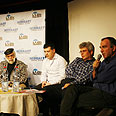
'Okay, we've done an Arab drama.' Symposium
צילום: Roni Schutzer
Panel discusses integration of Arabs citizens in Israeli media
'There's affirmative action for women and there's affirmative action for Arab minorities in the government, but not in private organizations,' veteran journalist says
The innovative television program Avoda Aravit (Arab Work), blazed new ground and peaked viewers' interest by offering Israeli viewers a story-line featuring an Israeli Arab family. But the creative team behind the program charged on Thursday that Keshet, the network it airs on, is not giving the program its due and might jump to a competitor for its second season.
Director Danny Paran predicted that there would likely be three or four seasons of the show, but "it might not be with Keshet." Paran said, "There is Channel 10, there is Reshet, there is Hot and there is YES."
Paran was addressing a group of Israeli and Palestinian journalists and social activists as part of a panel discussing the integration of minorities into the mainstream of Israeli media.
The symposium was organized by The Mideast Press Club, an initiative of The Media Line News Agency; and The Citizens' Accord Forum Between Jews and Arabs in Israel.
There were problems with Keshet from the beginning, said Sayed Kashua, the program's creator and writer. He said he felt Keshet was not supportive of the series from the outset.
"My feeling is that Keshet didn't know what to do with the show," he said. "They wanted to tick it off and say, 'Okay, we've done an Arab drama.' I think they were scared about the number of viewers."
Udi Leon, the director of special programming and multicultural diversity at Keshet Broadcasting, said Keshet took on the show because they believed it was a good idea.
A major challenge the show faced was the costly production, he said, adding that dramas, traditionally, are limited in the numbers of viewers.
'No Arabs, of course, would be there'
Leon was not surprised that there were no officials from the Israel Broadcasting Authority present at the panel.
"They know very well why they didn't come," Leon said. "We did Avoda Aravit, but they're the public channel. Where is their Arab Work? What are they doing? Zero. All over the world the dramas are done by public channels or by cable."
Panelists also discussed how Arab citizens could be better integrated into Israeli media; or indeed, whether there should be efforts to have them integrated at all.
Arabs represent a fifth of the Israeli population, but are under-represented in Israeli media according to that percentage.
"I, personally, don't think that we need Arabs in the news," Kashua said. "I don't care if we're watching an Arab reporter or a Jewish reporter. I just want to see an intelligent reporter or someone who shares the same ideas that I have. If they can train Israeli journalists to be less nationalist and a little more open-minded and human, it will be more than enough for me."
Veteran journalist Anat Saragusti is training an Arab from northern Israel to be a part of the mainstream Channel Two news team. The law, she said, is very vague about quotas for minorities in the media.
"There's affirmative action for women and there's affirmative action for Arab minorities in the government, but not in private organizations," she said.
Saragusti lamented the lack of accessible channels for a wider range of Israelis to be journalists in the electronic media.
Most of the reporters on Channel Two grew out of Army Radio, where they did their military service, she said.
Army Radio is considered the best school of journalism in the country, because unlike media courses in Israeli universities and colleges, the work at the army station is practical, not theoretical.
Most soldiers who are aspiring journalists will find it very hard to be accepted in a sought-after position in Army Radio unless they are well-connected.
"No Arabs, of course, would be there," Saragusti said. "You won't find any Arab, any Russian immigrant or any Ethiopian immigrant. What you will find there is the stronger part of society."
She concluded that extensive efforts had to be exerted in order to incorporate any minority into the mainstream news teams.
Article republished by permission of The Media Line










